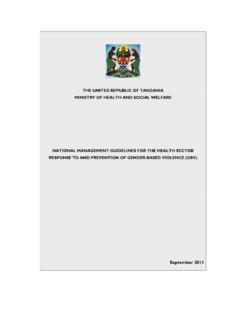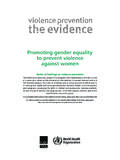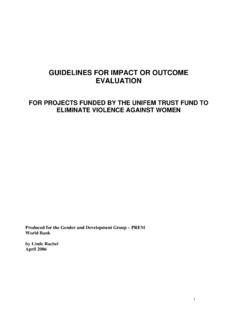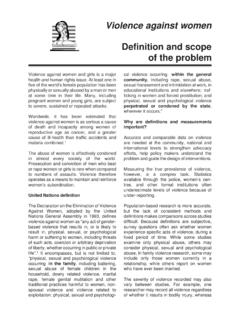Transcription of FACT SHEET COMBATING SEXUAL AND GENDER …
1 FACT SHEETCOMBATING SEXUAL AND GENDER based violence IN LIBERIAA Joint Programme of the Government of Liberia and the United Nations CONTEXTS exual and GENDER - based violence (SGBV) is not only prevalent in Liberian society; it is unfortunately accepted as an integral part of GENDER relations. This perception was exacerbated during the war years, as SGBV was used repeatedly as a weapon of many Liberian women and girls, the appalling violence they experienced during wartime still occurs. Rape continues to be the most frequently reported serious crime in Liberia. In 2007, 46 percent of reported rape cases to the Liberian National Police involved children under age 18. During the conflict, the perpetrators were mainly fighting forces ( percent). However, after the conflict the perpetrators include not just ex-combatants, but community or family members, teachers, husbands or partners. SGBV does not only lead to physical and mental trauma for the victim.
2 It often carries longer-term social consequences for the victims themselves, such as stigmatization by their families and the community. Around 15 percent of those who were raped ended up getting pregnant. A high rate of divorce ( percent) and wife abandonment often follow. Reports from the Miinistry of GENDER and Development in 2008 show a similar trend: 34 percent out of over 10,000 reported protection incidents are SGBV related. Domestic violence is the most prevalent of all protection incidents (26 percent out of all reported cases).KEY FACTSD uration: July 2008 June 2010 (1st phase) July 2010 June 2012 (2nd phase)Total funding: US$ 13,230,000 Funding available: US$ 4,615, 799 Lead Ministry: Ministry of GENDER and DevelopmentOther Ministries: Ministries of Justice and HealthUN Agencies : UNICEF, UNDP,UNIFEM, UNFPA, UNHCR, UNMIL, WHO. 1) Psychosocial Pillar: WHO 2) Health Pillar: UNFPA 3) Legal Pillar: UNDP 4) Security/Protection Pillar: UNMIL (UNIFEM alternate) 5) Coordination: The MoGD supported by the Joint Programme Management PRIORITIES: Community participation Advocacy and communication Sensitization and awareness creation Education and capacity enhancement Collaborative Management, Partnerships and Networking Youth and male involvement Strengthening the systems for managing of GBV related data and information (at national and county level)THE FIVE OUTCOME AREAS Enhancing psychosocial well-being for SGBV survivors; involves access to community- based psychosocial care Improving medical well-being of SGBV survivors.
3 Increasing the number of health workers and counsellors trained in the clinical management of rape and on health aspects of SGBV Strengthening the criminal justice system to effectively respond to SGBV, including rehabilitating and equipping a court to prosecute SEXUAL offenders Integrating security and protection system to prevent and manage SGBV, including building up accessibility to safe homes for SGBV survivors, as well as expanding peer and school- based prevention and referral networks Strengthening capacity building, management and coordination mechanisms, to enable, in particular, the Ministry of GENDER to better address SGBV issues on its own in future A Joint Programme of the Government of Liberia and the United NationsFACT SHEET : SEXUAL AND GENDER based VIOLENCEJOINT PROGRAMMEA Joint Programme signed between the Government of Liberia and the United Nations is helping address the issue of wide-scale SEXUAL exploitation and abuse cases, and SEXUAL and GENDER - based violence (SGBV) through the implementation of both prevention and response measures.
4 The Joint Programme has been designed in line with the security and protection component of the Government s Poverty Reduction Strategy (PRS). It offers a comprehensive and integrated approach to reducing SGBV in the country and is designed to support Liberia s National GBV Plan of Action (POA), minimizing GBV by 30 percent by 2011, while providing appropriate care and services to survivors of GBV in Liberia. The Joint Programme supports each of the five pillars in the Plan of Action, with a range of interventions in each. (See box) A preventive strategy targeting men and women that strives for knowledge, attitudinal and behavioral change, by raising awareness of SGBV across all these pillars will be central to the Joint Programme. It will involve a mix of advocacy and public awareness campaigns using various media at the community, county and national level.
5 The Joint Programme is aligned with the time-frame of the PRS with a first phase being implemented from 1 June 2008 to 31 May 2010. The second phase will be implemented from 1 June 2010 31st May 2012. The UN will draw upon its extensive experience and presence in all counties and districts in the country to enable a coordinated response to a complex problem that requires action on a number of different fronts. Participating UN Agencies include the United Nations Children s Fund (UNICEF), United Nations Development Programme (UNDP), United Nations Fund for Women (UNIFEM), United Nations Population Fund (UNFPA), the Office of the United Nations High Commissioner for Refugees (UNHCR), United Nations Mission in Liberia (UNMIL) and World Health Organization (WHO).It is crucial that this issue is addressed not least because of the physical and psychological trauma on victims, but because it is one of the most important components that will help cement the peace and empower women and children.
6 It also cuts across a number of areas covered under the PRS. A Joint Programme of the Government of Liberia and the United NationsIMPLEMENTING MODALITIESThe mechanism that will help carry forward this Joint Programme is already in place. A National GBV Task Force, chaired by the Liberian Ministry of GENDER and Development and comprising national and international NGOs, UN agencies and representatives from the Government of Liberia, is charged with implementing the plan of action. The programme management team will work closely with the existing GBV unit in the Ministry of GENDER , eliminating the need for costly additional overheads or time delays. At the head of each Joint Programme pillar a lead agency will enhance coordination, effectiveness and accountability, with an emphasis on Ministry of GENDER and Development is leading the coordination pillar of the Joint Programme.
7 The UN will draw upon its expertise and presence in all counties and districts in the country, to enable a coordinated response to a complex problem that requires action on a number of different fronts. FUNDING REQUIREMENTSD onor support for this Joint Programme presents an opportunity for the international community to come together to bring a measurable difference to the lives of thousands of Liberian women. The total budget for the Joint Programme on SEXUAL GENDER based violence is US $ Joint Programme is the product of an extensive review process, and was recently validated at the National Women s Conference that brought together 300 women from all over Liberia. FACT SHEET : SEXUAL AND GENDER based VIOLENCEA Joint Programme of the Government of Liberia and the United NationsCONTACTS: Vabah Gayflor, Minister of GENDER and Development, Liberia E-mail: Sarkar, Program Advisor, UN Government SGBV Joint ProgramTel.
8 +231 06759914. E-mail: STUDYS pecial Court for SGBV casesHundreds of criminal court cases in relation to SGBV were stuck in the courts as the judicial system worked to clear years of back-logged criminal cases. This meant that the level of prosecution of SGBV related cases was low, resulting in victims suffering long delays in getting their cases heard and a low level of perpetrators being punished for their crimes. The result was that women and girls were not reporting many of the crimes as they were of the view that prosecutions would not follow, and that the low level of prosecutions were not deterrent enough to prevent the continued incidence of Government of Liberia (GoL) led project, supported by UNFPA, and funded by the Government of Denmark sought to set up, and fully equip a special court to deal with cases relating to SGBV.
9 The reason for setting up the court was to strengthen the judicial system to quickly and adequately hear SGBV related criminal proceedings. The second objective of the project was to build the capacity of legal professionals and court officials who will work in the special Special Court E , as it is called, is also equipped to conduct in-camera trials involving rape cases, allowing for protection of the identity of the victim and the witnesses during testimonies. This is in accordance with international standards. Criminal Court E will be operational throughout the year in two terms of court of six months each. FACT SHEET : SEXUAL AND GENDER based violence








